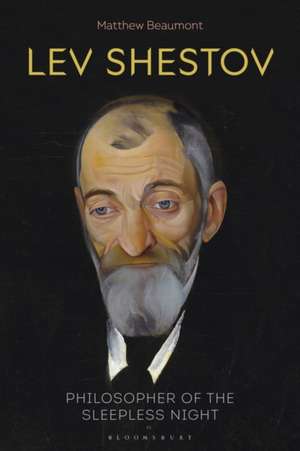Lev Shestov: Philosopher of the Sleepless Night
Autor Dr Matthew Beaumonten Limba Engleză Hardback – 16 sep 2020
| Toate formatele și edițiile | Preț | Express |
|---|---|---|
| Paperback (1) | 197.05 lei 6-8 săpt. | |
| Bloomsbury Publishing – 23 mar 2022 | 197.05 lei 6-8 săpt. | |
| Hardback (1) | 597.63 lei 6-8 săpt. | |
| Bloomsbury Publishing – 16 sep 2020 | 597.63 lei 6-8 săpt. |
Preț: 597.63 lei
Preț vechi: 858.09 lei
-30% Nou
Puncte Express: 896
Preț estimativ în valută:
114.37€ • 117.99$ • 96.80£
114.37€ • 117.99$ • 96.80£
Carte tipărită la comandă
Livrare economică 04-18 martie
Preluare comenzi: 021 569.72.76
Specificații
ISBN-13: 9781350151147
ISBN-10: 1350151149
Pagini: 216
Dimensiuni: 156 x 234 x 21 mm
Greutate: 0.48 kg
Editura: Bloomsbury Publishing
Colecția Bloomsbury Academic
Locul publicării:London, United Kingdom
ISBN-10: 1350151149
Pagini: 216
Dimensiuni: 156 x 234 x 21 mm
Greutate: 0.48 kg
Editura: Bloomsbury Publishing
Colecția Bloomsbury Academic
Locul publicării:London, United Kingdom
Caracteristici
Few other English-language books on Lev Shestov
Notă biografică
Matthew Beaumont is Professor of English at University College London, UK and the author of several books, including two on the topic of late nineteenth-century utopianism. He has also edited several essay collections and published numerous articles in scholarly journals.
Cuprins
1. Preface: Staying Woke and Staying Awake2. Introduction: Athens and Jerusalem3. Chapter 1- Philosophy and Antiphilosophy: Shestov's Life and Thought4. Chapter 2 - Angel of History and Angel of Death: Shestov, Bataille, Benjamin5. Chapter 3 - The Garden and the Wasteland: The Art of Gethsemane6. Chapter 4 - Sleep and the Sleepless: Pascal and the Night of Gethsemane7. Conclusion: Auschwitz and the End of the World
Recenzii
Serves as the first overdue step towards bringing to contemporary readers an inspired and original interpretation of an otherwise forgotten philosopher . A fresh and concise starting point for engaging with Shestov's works as a whole . Beaumont's work deserves a close and attentive reading.
Beaumont has contributed enormously to defining the 'philosophical force-field' of Shestov's major works.
A wonderful introduction to Shestov's thought . placing this intriguing, but much neglected, figure in the company of Benjamin, Adorno, Deleuze and Badiou.
Lev Shestov created a new science - the psychology of philosophy. He understood individual philosophical discourses as the attempts of their authors to conceal their personal traumas. In his book, Matthew Beaumont brilliantly reconstructs the main themes of Shestov's writing and his influence on European philosophy of the 20th Century. Necessary reading for everybody interested in modern European intellectual history.
Matthew Beaumont reflects on what we can learn from an insomniac who has spent his sleepless nights trying to unravel the stems of suffering and brutality. Shestov is beset by missed encounters, and Beaumont comes to make good those absences, tangling Shestov's thoughts with the moral and critical thinking of his contemporaries and ours.
Matthew Beaumont's book on Shestov weaves the thread of sleeplessness into a gripping reconstruction of the philosopher's journey across some of the defining Gethsemane moments of the twentieth-century with a political commentator's sense of momentous encounters.
Beaumont has contributed enormously to defining the 'philosophical force-field' of Shestov's major works.
A wonderful introduction to Shestov's thought . placing this intriguing, but much neglected, figure in the company of Benjamin, Adorno, Deleuze and Badiou.
Lev Shestov created a new science - the psychology of philosophy. He understood individual philosophical discourses as the attempts of their authors to conceal their personal traumas. In his book, Matthew Beaumont brilliantly reconstructs the main themes of Shestov's writing and his influence on European philosophy of the 20th Century. Necessary reading for everybody interested in modern European intellectual history.
Matthew Beaumont reflects on what we can learn from an insomniac who has spent his sleepless nights trying to unravel the stems of suffering and brutality. Shestov is beset by missed encounters, and Beaumont comes to make good those absences, tangling Shestov's thoughts with the moral and critical thinking of his contemporaries and ours.
Matthew Beaumont's book on Shestov weaves the thread of sleeplessness into a gripping reconstruction of the philosopher's journey across some of the defining Gethsemane moments of the twentieth-century with a political commentator's sense of momentous encounters.
